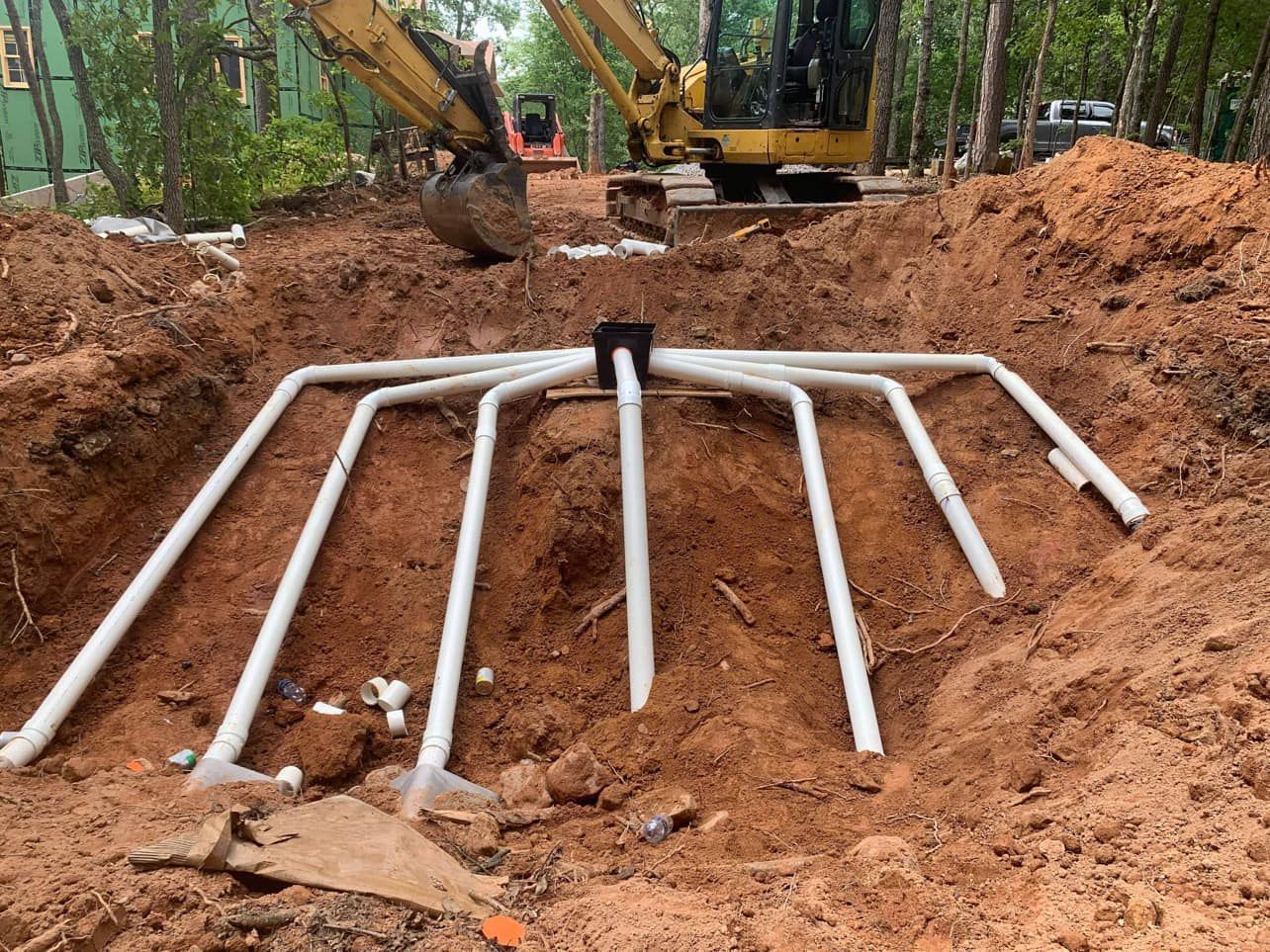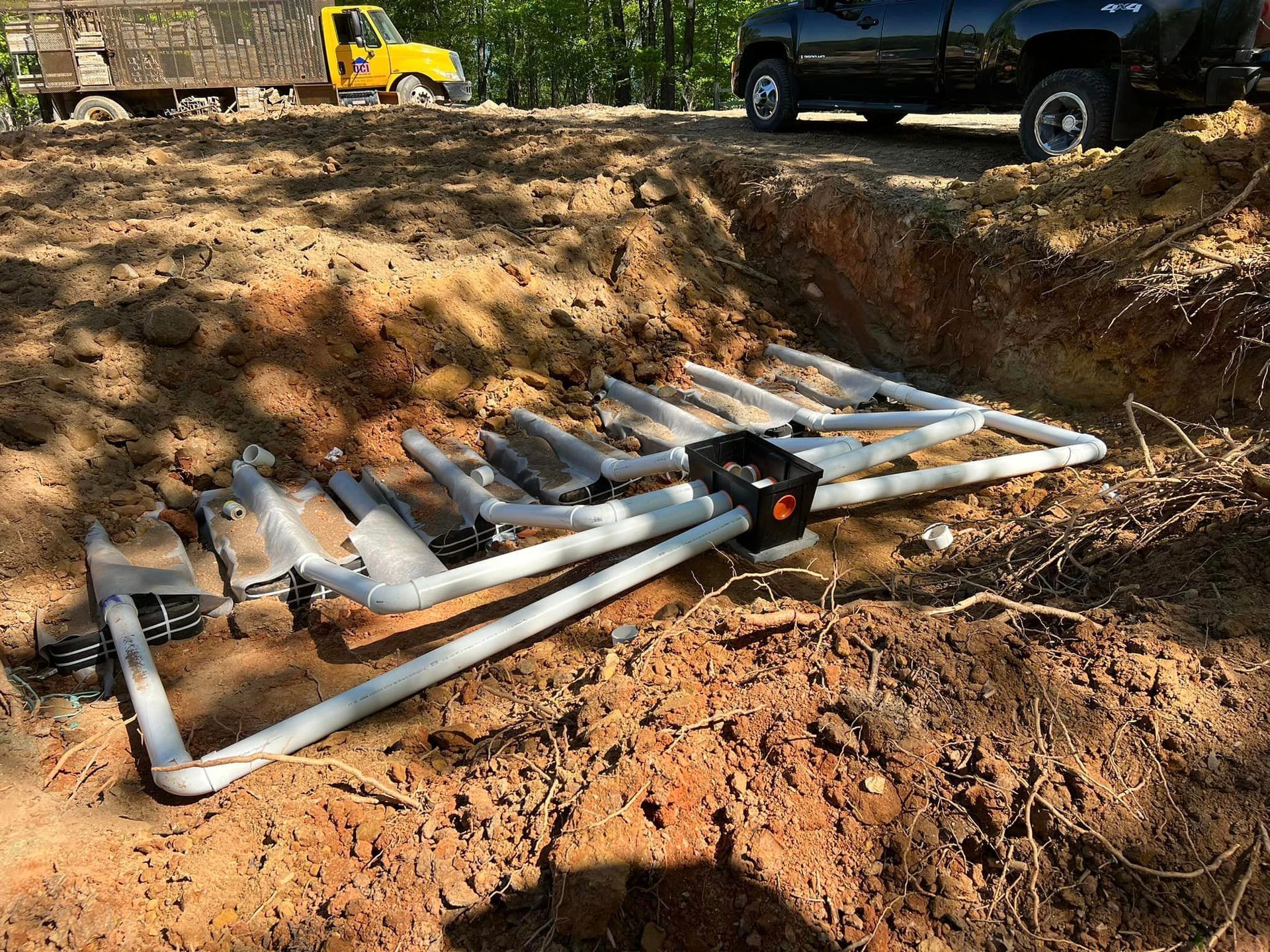Mound Septic
Mound Septic Systems
Welcome to EWS Septic, your trusted partner for all your Mound Septic System needs. We have years of industry experience. We are proud to be experts in designing, installing, and maintaining mound septic systems. But what exactly is a mound septic system? Let us explain.
A mound septic system is a specialized wastewater treatment system. It's designed for properties with challenging soil conditions or high water tables. It is an alternative to traditional septic systems.
Components of a Mound Septic System
A mound septic system consists of several key components. They work together to effectively treat and dispose of wastewater. These components include:
Septic Tank
The septic tank is where wastewater from your home flows into. It allows solid waste to settle at the bottom while allowing liquids to pass through.
Distribution Pipes
These pipes distribute the treated wastewater evenly throughout the mound system. They ensure that the effluent is evenly distributed for proper filtration.
Mound
The mound, designed for wastewater treatment, comprises layers of sand, gravel, and soil, acting as natural filters to remove impurities before releasing water into the surrounding soil.
Maintenance and Care
Regular maintenance and care are essential for the long-term functionality and efficiency of a mound septic system. Here are some recommendations:
Regular Inspections
Schedule regular inspections with a professional septic service provider. This ensures that all components are functioning properly. It also helps identify any potential issues.
Pumping
Depending on the size of your household and the usage, the septic tank may need to be pumped every few years. Regular pumping helps prevent the accumulation of solids and maintains the system's efficiency.
Waste Disposal
Avoid flushing non-biodegradable items or chemicals down the drain. These can disrupt the natural treatment process and potentially damage the system.
How Does a Mound Septic System Work?
Now that we understand the components, let's dive into how a mound septic system works. When wastewater enters the septic tank, it undergoes a natural separation process. Solid waste settles at the bottom, while oils and lighter materials float to the top. The remaining liquid, known as effluent, is then distributed through the pipes into the mound.
As the effluent moves through the mound, it undergoes a natural filtration process. The layers of sand, gravel, and soil act as filters, removing impurities and harmful bacteria. By the time the effluent reaches the bottom of the mound, it has been effectively treated and is ready to be released into the surrounding soil.
Mound Septic System Cost
The cost of installing a mound septic system can vary depending on several factors. These factors include the size of the system, the specific site conditions, and any additional requirements. When budgeting for a mound septic system, consider both the initial installation costs and any ongoing maintenance expenses.
At EWS Septic, we provide transparent pricing and will work closely with you to ensure that you have a clear understanding of the costs involved. Our team will assess your property and provide you with an accurate estimate based on your specific needs.
Mound Septic System Landscaping Considerations
Proper landscaping around a mound septic system is crucial for its functionality and visual appeal. Here are some important considerations:
Avoid Planting Trees
The roots of certain plants can interfere with the integrity of the mound and its components. It's best to choose plants with shallow root systems to prevent any damage.
Maintain Vegetative Cover
To prevent erosion and maintain structural integrity, cover the mound with grass or vegetation. This protective measure ensures the longevity and stability of the mound system.
Avoid Excessive Watering
Avoid overwatering the mound to maintain its wastewater treatment efficiency. Be mindful of watering practices, preventing excess irrigation near the mound for optimal performance.
Advantages of Mound Septic Systems
Mound septic systems offer several advantages. They are a popular choice for properties with specific needs. Here are some key advantages:
Challenging Soil Conditions
Mound septic systems are ideal for properties with high water tables or poor soil conditions. The raised mound provides the necessary filtration and treatment. It works even in areas where traditional septic systems may not be feasible.
Environmental Benefits
It is vital for reducing the risk of groundwater contamination. Through natural filtration, the mound efficiently removes impurities, ensuring the released wastewater is thoroughly treated before entering the soil, contributing to environmental protection and maintaining water quality.
Why Choose EWS Septic?
When it comes to your mound septic system needs, choosing the right service provider is crucial. Here's why EWS Septic stands out from the rest:
Expertise
With years of experience in the industry, our team at EWS Septic has developed a deep understanding of mound septic systems. We have the knowledge and expertise to handle all aspects of installation, maintenance, and repairs.
Experience
We have successfully completed many mound septic system projects. We cater to a wide range of properties and unique requirements. Our experience allows us to tackle any challenges that may arise during the installation or maintenance process.
Professionalism
At EWS Septic, we prioritize professionalism in all aspects of our work. From our first meeting to the project's completion, you can expect clear communication. You can also expect timely responses and a commitment to delivering high-quality service.
Personalized Approach
We understand that every property is unique, and we take the time to assess your specific needs. Our team will work closely with you to develop a customized solution. It will meet your requirements and ensure the optimal performance of your mound septic system.
Reliable Service
When you choose EWS Septic, you can rely on us to provide dependable and efficient service. We strive to exceed your expectations and ensure that your mound septic system operates smoothly for years to come.
Choose EWS Septic for your mound septic system needs. You'll get a team of professionals dedicated to exceptional results. Contact us today to discuss your project and experience the EWS Septic difference.
Mound Septic FAQs
-
How long does a mound septic system last?
With proper maintenance and care, a well-designed and installed mound septic system can last for several decades.
-
Why would I need a mound septic system?
Properties with high water tables, poor soil conditions, or environmental regulations often require mound septic systems. These regulations restrict the use of traditional septic systems.
-
How does a mound system handle heavy rainfall or flooding events?
Mound septic systems are designed to handle heavy rainfall and flooding events. The raised mound provides additional protection against saturation. It also ensures proper treatment and disposal of wastewater.
-
Are there specific dos and don'ts for homeowners with a mound septic system?
Yes, there are certain guidelines to follow. Avoid flushing non-biodegradable items, chemicals, or excessive water usage. Regular maintenance and inspections are also important to ensure the system's proper functioning.
Schedule Now
Connect with us for swift assistance with your Mound Septic System
Choose EWS Septic for superior Mound Septic Systems. Rely on our expertise, professionalism, and comprehensive solutions for effective resolution of your septic issues.
Contact us now to schedule efficient service or gather information about our dedicated offerings. We are dedicated to addressing your septic concerns with excellence and reliability.
All Rights Reserved | EWS Septic


